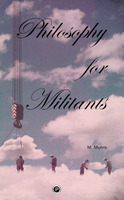Philosophy for Militants
Author(s)
Munro, Michael
Collection
ScholarLedLanguage
EnglishAbstract
“No longer imminent, the End is immanent.” “Ends are ends,” Frank Kermode goes on to clarify, “only when they are not negative but frankly transfigure the events in which they were immanent.” From its imminence to its immanence, not “negative,” “no longer,” but transformative, how is “the End” in turn “transfigured”? In what may ending be said then to consist? To “the end times” of apocalypse and eschatology Giorgio Agamben, following Gianni Carchia, opposes messianism and “messianic time”—to the end of time, in a formula, the time of the end. To the writings of those for whom to philosophize is to learn how to die—from Plato to Montaigne and beyond—one may oppose, in like manner, the writings of Spinoza, who “thinks of death least of all things”—“for nature is Messianic by reason of its eternal and total passing away,” as Benjamin writes—and so in whose pages “wisdom,” transfigured, “is a meditation on life.”
Keywords
philosophy; utopia; philology; poetics; parablesDOI
10.21983/P3.0168.1.00ISBN
9780998531823OCN
1048189162Publisher
punctum booksPublisher website
https://punctumbooks.com/Publication date and place
Brooklyn, NY, 2017Classification
Western philosophy from c 1800


 Download
Download